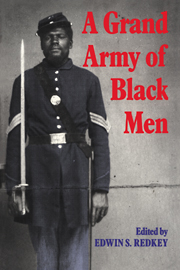Book contents
- Frontmatter
- Contents
- Preface
- Acknowledgments
- List of Abbreviations
- Introduction: For Freedom and Equality
- 1 Black Soldiers in White Regiments
- 2 South Carolina, Georgia, and Florida
- 3 Virginia and North Carolina
- 4 The Gulf States
- 5 Occupation Duty
- 6 For the Rights of Citizens
- 7 The Struggle for Equal Pay
- 8 Racism in the Army
- 9 The Navy
- 10 War's End
- Index
- Cambridge Cultural Social Studies
Introduction: For Freedom and Equality
Published online by Cambridge University Press: 24 March 2010
- Frontmatter
- Contents
- Preface
- Acknowledgments
- List of Abbreviations
- Introduction: For Freedom and Equality
- 1 Black Soldiers in White Regiments
- 2 South Carolina, Georgia, and Florida
- 3 Virginia and North Carolina
- 4 The Gulf States
- 5 Occupation Duty
- 6 For the Rights of Citizens
- 7 The Struggle for Equal Pay
- 8 Racism in the Army
- 9 The Navy
- 10 War's End
- Index
- Cambridge Cultural Social Studies
Summary
FOR A CENTURY after the Civil War, most Americans thought that blacks had done little or nothing to win their freedom from slavery. During the Civil Rights Movement of the 1950s and 1960s, renewed study of African-American history corrected that old ignorance and showed that almost 200,000 black soldiers (and thousands of black sailors) had served the Union. But most interested people thought that those soldiers were newly freed slaves, capable only of labor, afraid of battle, illiterate, and ignorant of the more complex issues of the war.
Forgotten were the thousands of free black men from the Northern states who had fought not only to free the slaves and preserve the Union but also to show the world that they, as much as any other men, deserved to be full partners in the United States. From Vermont and Maryland, from Massachusetts and Iowa, from every one of the Union states, they had put on blue uniforms to show their patriotism and manhood. From 1863 to 1865 they had marched and fought, suffered and died from rebel bullets and army diseases, just as the white troops had done. Whites did not know or care that these Northern black soldiers were different from the slaves, that they could read and write as well as most whites, that they were prepared to struggle not only against rebellion in the South but against racism everywhere.
These brave, free black men let the nation know how they felt about the war. A few were college-trained, many had a public school education, and some were just learning to read and write.
- Type
- Chapter
- Information
- A Grand Army of Black MenLetters from African-American Soldiers in the Union Army 1861–1865, pp. 1 - 8Publisher: Cambridge University PressPrint publication year: 1992



